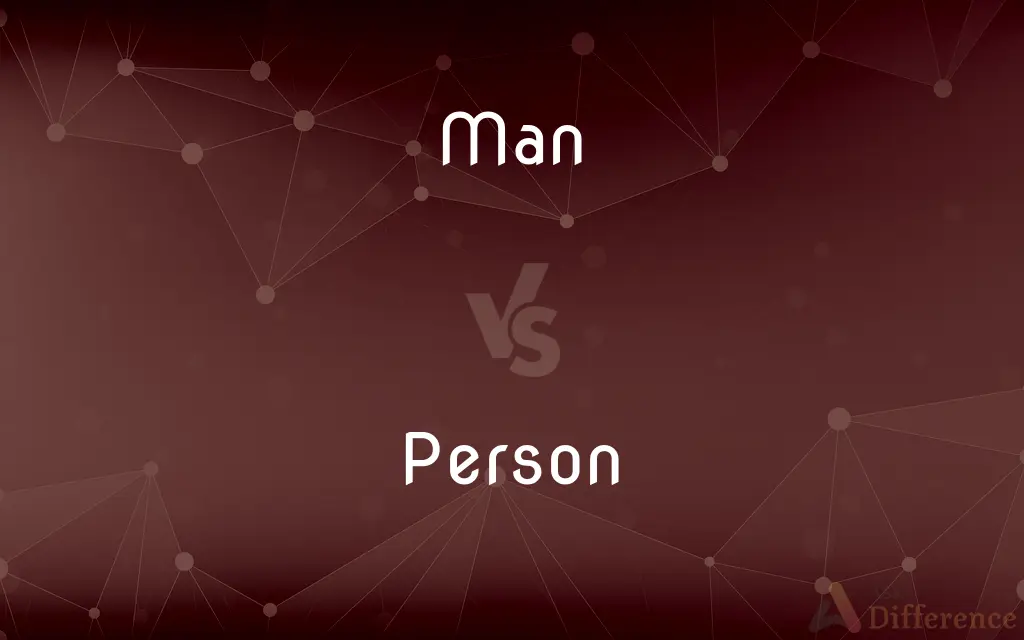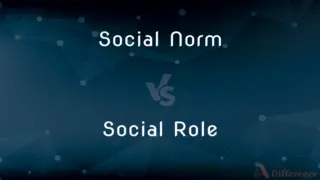Man vs. Person — What's the Difference?
By Urooj Arif & Maham Liaqat — Published on April 7, 2024
"Man" often refers specifically to males or humanity collectively, emphasizing gender or species, while "person" denotes any individual human being, highlighting individuality without specifying gender.

Difference Between Man and Person
Table of Contents
ADVERTISEMENT
Key Differences
The term "man" is traditionally used to describe human males, distinguishing them from women and children in terms of gender. On the other hand, "person" is a gender-neutral term that refers to any individual human being, regardless of age or gender, emphasizing the concept of personhood and individuality.
While "man" can also be used in a broader sense to refer to human beings in general, as in "mankind," denoting humanity as a whole, "person" specifically focuses on the singular or plural individuals, stressing the importance of recognizing each human being's uniqueness and rights. This distinction becomes important in legal and formal contexts where specificity and inclusivity are necessary.
In many contexts, the use of "man" to represent humanity has been criticized for being gender-biased and excluding half of the population. Conversely, "person" is preferred for its inclusivity and neutrality, making it a more appropriate choice in many modern and formal settings where gender equality is emphasized.
The evolution of language reflects changing societal attitudes towards gender and inclusivity. The shift from using "man" to denote humanity or generic individuals towards more gender-neutral terms like "person" highlights an increasing awareness and sensitivity towards gender issues and the representation of all individuals.
Comparison Chart
Definition
Specifically refers to male human. Also used broadly for all humanity.
Refers to an individual human being, regardless of gender or age.
ADVERTISEMENT
Gender Specificity
Gender-specific, emphasizing maleness or humanity in a traditional sense.
Gender-neutral, applicable to any human being.
Usage Context
Traditional usage for males and collective humanity. Can be seen as exclusionary.
Modern, inclusive term for individuals, preferred in formal and legal contexts.
Societal Implications
May imply gender bias or exclusion in contemporary contexts.
Promotes gender neutrality and inclusivity.
Evolution
Historically dominant but evolving due to changing views on gender and language.
Increasingly favored for its neutrality and respect for individuality.
Compare with Definitions
Man
As a gender-specific term, it identifies human males.
The man walked his dog.
Person
Identifies any human being without specifying gender.
Every person has rights.
Man
Used collectively, it can refer to all human beings.
Man has always been fascinated by the stars.
Person
Used to highlight individuality.
She is a person of great talent.
Man
Historically denotes human achievement.
Man landing on the moon was a monumental event.
Person
Legal contexts prefer person for its neutrality.
The accused person was found guilty.
Man
Can imply maturity and adulthood in males.
He grew into a fine man.
Person
Can denote one in a group or alone.
There was only one person in the room.
Man
Sometimes used to assert masculinity.
He is considered the man of the house.
Person
Stresses the humanity of an individual.
Treat each person with respect.
Man
A male human endowed with qualities, such as strength, considered characteristic of manhood.
Person
A living human. Often used in combination
Chairperson.
Salesperson. See Usage Note at chairman.
Man
A male representative, as of a country or company
Our man in Tokyo.
Person
An individual of specified character
A person of importance.
Man
A person, usually male, who has duties or skills associated with a specified thing. Used as the last element of a compound.
I wanted to be a guitar man on a road tour, but instead I’m a flag man on a road crew.
Person
The composite of characteristics that make up an individual personality; the self.
Man
A person, usually male, who can fulfill one's requirements with regard to a specified matter.
Person
The living body of a human
Searched the prisoner's person.
Man
A male who belongs to a particular group: an employee, a student or alumnus, a representative, etc.
Person
An individual substance of a rational nature; usually a human being.
Each person is unique, both mentally and physically.
Man
The male portion of the human race.
Woman has, in general, much stronger propensity than man to the discharge of parental duties.
Person
The physical body of a being seen as distinct from the mind, character, etc.
Man
Any living or extinct member of the family Hominidae
Person
The bodily form of a human being; body; outward appearance; as, of comely person.
A fair persone, and strong, and young of age.
If it assume my noble father's person.
Love, sweetness, goodness, in her person shined.
Man
A male person who plays a significant role (husband or lover or boyfriend) in the life of a particular woman;
She takes good care of her man
Person
A living, self-conscious being, as distinct from an animal or a thing; a moral agent; a human being; a man, woman, or child.
Consider what person stands for; which, I think, is a thinking, intelligent being, that has reason and reflection.
Person
A human being;
There was too much for one person to do
Common Curiosities
Why is "person" preferred in formal contexts?
"Person" is preferred for its neutrality and inclusivity, avoiding gender bias and ensuring clarity and fairness in legal and formal settings.
Is it incorrect to use "man" when referring to an individual of unknown gender?
Yes, it's considered more appropriate and respectful to use "person" or another gender-neutral term when the individual's gender is unknown or irrelevant.
How has the usage of "man" and "person" evolved over time?
The usage has shifted from "man" being a default representation of humans to a more conscious use of "person" to ensure inclusivity and respect for all genders.
What impact does the choice between "man" and "person" have on language?
The choice impacts the inclusivity and gender sensitivity of language, reflecting and influencing societal attitudes towards gender equality.
Does the preference for "person" over "man" signify broader social changes?
Yes, it reflects growing awareness of and commitment to gender equality, inclusivity, and respect for individual identity.
How does the legal system view the terms "man" and "person"?
The legal system prefers "person" for its clarity and neutrality, ensuring that laws and rights are applied equally to all individuals.
Can "man" still be used to refer to all of humanity?
While "man" can refer to all humanity, its use is decreasing in favor of more inclusive terms like "humankind" or "humanity."
Is "personhood" related to the term "person"?
Yes, "personhood" emphasizes the qualities or condition of being an individual person, often in ethical or legal discussions about rights and dignity.
How do cultural perceptions of "man" and "person" vary?
Cultural perceptions can influence the interpretation and acceptance of these terms, with some cultures being more sensitive to their implications than others.
What role does education play in the usage of "man" and "person"?
Education can foster awareness of the implications of language use, promoting more inclusive and respectful communication practices.
How can one navigate the use of these terms in everyday language?
Awareness and consideration of context and audience can guide the appropriate use of "man" or "person," leaning towards inclusivity and respect.
Can the misuse of "man" in place of "person" be considered gender discrimination?
In certain contexts, it might be viewed as contributing to gender bias, underscoring the importance of conscious language use.
Are there alternatives to using "man" when referring to humanity?
Alternatives like "humankind," "humanity," or "people" are preferred for their inclusivity and lack of gender bias.
Share Your Discovery

Previous Comparison
Social Norm vs. Social Role
Next Comparison
Adequan vs. LegendAuthor Spotlight
Written by
Urooj ArifUrooj is a skilled content writer at Ask Difference, known for her exceptional ability to simplify complex topics into engaging and informative content. With a passion for research and a flair for clear, concise writing, she consistently delivers articles that resonate with our diverse audience.
Co-written by
Maham Liaqat















































